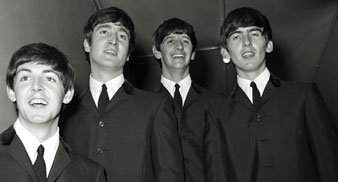Former Beatles and Rolling Stones manager and music mogul, Allen Klein has died in New York aged 77.
The Associated Press reports that he died at home, after suffering from Alzheimer’s disease.
***
OBITUARY: ALLEN KLEIN 1931 – 2009
When, in 1970, the media was looking for a culprit to blame for the break-up of The Beatles, the easiest and most obvious targets were the women. Yoko Ono and Linda Eastman were inevitably in the frame, perceived as self-serving distractions that kept the group’s most celebrated creative energies from doing what we all expected them to do for the rest of their lives.
But beyond the bold-type banners and quick-fix solutions of the tabloids, a shadowy figure loomed large a few paragraphs further into the story. Allen Klein was the man entrusted with making sense of the increasingly complex and wayward state of the Fab Four’s business empire, which had been left to run riot since the death of Brian Epstein in 1967.
Klein, the son of Hungarian immigrants living in New Jersey, had a remarkable, if questionable, track record, having first dipped his toe in the entertainment industry as Sam Cooke’s accountant for the last year of the soul star’s life. But it was as the predatory and ruthless representative of the moptops’ most immediate rivals, The Rolling Stones, that he cemented his reputation as a fierce and uncompromising figure not to be messed with.
He “bought” the band from Andrew Loog Oldham in the mid-1960s, and although London School of Economics alumnus Mick Jagger was initially impressed by Klein’s savvy, no-nonsense approach, he became suspicious of his motives. Jagger ultimately steered his group towards the pioneering self-sufficient business model they remain to this day, but not before he recommended Klein to The Beatles.
John Lennon first met Klein on the set of the Stones’ film Rock ‘n’ Roll Circus, and remembered him when Apple Corps was haemorrhaging money in 1969. George Harrison and Ringo Starr were persuaded to bring the American into the fold, although Paul McCartney angled to have his father-in-law, Lee Eastman, take charge of the group’s affairs. Klein’s first move was to renegotiate the group’s deal with EMI, securing them an unprecedented 10 per cent royalty rate. He then set about salvaging the hotch-potch of tapes for the all but abandoned album Get Back – finally released as Let It Be – by installing Phil Spector as producer to knock the sessions into shape, and sacked dozens of casual friends and hangers-on who he (most likely correctly) suspected were inflating the Apple wage bill while doing next to nothing for the company.
However, when he failed to wrest the The Beatles’ publishing house Northern Songs from its parent company ATV Songs, which would have given the group full control of their own music, McCartney moved to him replaced. The rest of the group wouldn’t play ball, and McCartney legally “divorced” his band mates and the world’s biggest pop stars were no more. Klein continued to work with Lennon, but his relationship with Harrison soured when George was sued for plagiarising The Chiffons’ “He’s So Fine” on his own “My Sweet Lord” – the plaintiff was a publishing company owned by Klein.
Harrison got a dig in at Klein in 1978, when he suggested to his friend Eric Idle that his spoof movie The Rutles should include a character based on the mogul. Enter John Belushi as Ron Decline, who is seen striking terror into his workers and smashing paintings over the heads of his closest allies.
Through his powerful entertainment firm ABKCO Klein bought up the rights to several artists’ work. The company still administers the Stones’ pre-1971 catalogue today, as well as the work of The Kinks, The Animals and sundry early 60s American stars. He controversially bought the Phil Spector catalogue for a knock-down price in the 1980s, when the producer found himself on the verge of bankruptcy.
Klein may largely have taken a back seat in the running of ABKCO in later years, although his fingerprints were all over the action the company took against The Verve when they sampled an orchestral version of the Stones hit “The Last Time” for their own “Bittersweet Symphony” in 1997. Arguing in court that the sample was too prevalent on the finished recording, Klein secured 100 per cent royaltes and full writing credit to Jagger & Richards on the track, proceeding to rub Richard Ashcroft’s nose in the dirt further by immediately licensing it to multi-million dollar TV adverts for Nike and Vauxhall.
He may have found himself at loggerheads with a large proportion of the people he worked with, but Klein’s approach to the music business was admired by many not so close to him, and it could be argued that he became a role model for a new type of mogul that has become the norm in today’s industry. McCartney remains unimpressed, 40 years after he famously put the end of The Beatles in motion with one short sentence to the unwanted controller of his purse strings: “If you are screwing us, I don’t see how.”
TERRY STAUNTON


